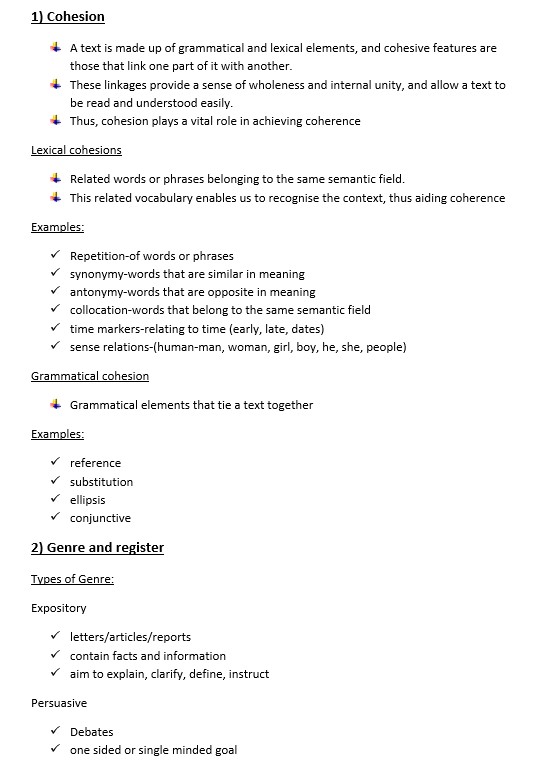Cohesion in English Texts
Summary:
The text discusses various aspects of effective writing, including cohesion, genre and register, textual/visual analysis, and essay writing. Cohesion refers to using grammatical and lexical elements to link parts of a text, while genre and register involve understanding the type and style of writing appropriate for a particular audience and purpose. Textual/visual analysis involves examining the language and layout of a text or image to understand its context, purpose, and audience. Finally, essay writing requires a clear introduction that addresses the topic and purpose of the essay, a main body that presents evidence and logical arguments, and a conclusion that summarizes the main points and their implications.
Excerpt:
Cohesion in English Texts
1) Cohesion
- A text is made up of grammatical and lexical elements, and cohesive features are those that link one part of it with another.
- These linkages provide a sense of wholeness and internal unity and allow a text to be read and understood easily.
- Thus, cohesion plays a vital role in achieving coherence
Lexical cohesion
- Related words or phrases belonging to the same semantic field.
- This related vocabulary enables us to recognise the context, thus aiding coherence
Examples:
- Repetition of words or phrases
- synonymy-words that are similar in meaning
- antonymy-words that are opposite in meaning
- collocation-words that belong to the same semantic field
- time markers relating to time (early, late, dates)
- sense relations-(human-man, woman, girl, boy, he, she, people)
Grammatical cohesion
- Grammatical elements that tie a text together
Examples:
- reference
- substitution
- ellipsis
- conjunctive
2) Genre and register
Types of Genre:
Expository
- letters/articles/reports
- contain facts and information
- aim to explain, clarify, define, instruct
Persuasive
- Debates
- one-sided or single-minded goal
- subjective and uses emotive language
- a personal conviction that a particular way of thinking is the only sensible way to think
- aims to convince the reader to adopt an opinion
Narrative
- fiction
- tells a story
- has a character/plot
Technical
- brochures/adverts
- contains specific terminology/inside language (jargon)
- usually short sentences
Types of register:
- Formal
- Consultative
- Frozen
- Intimate
- Causal
- Informal


Reviews